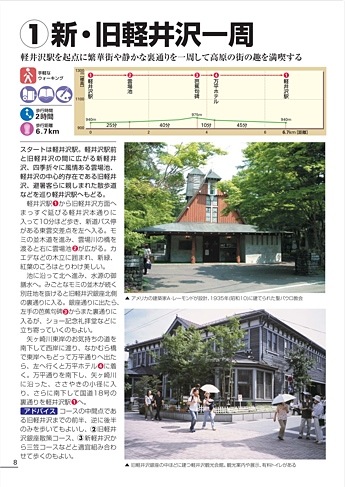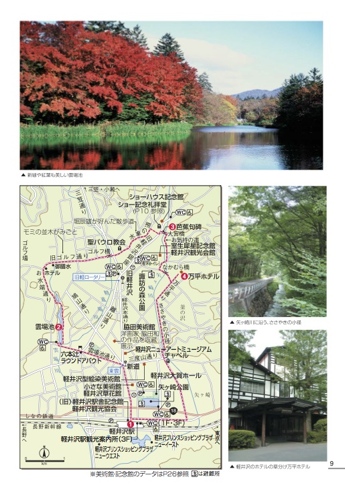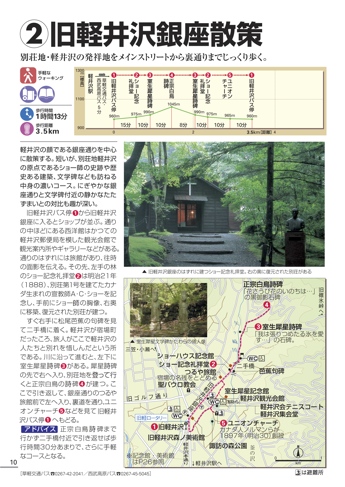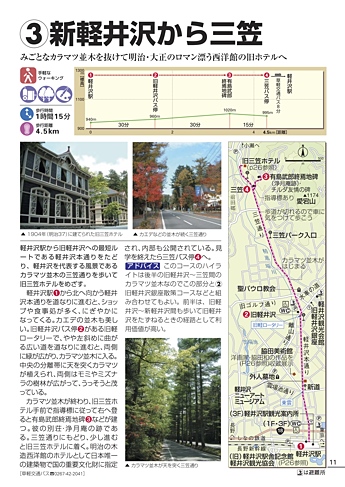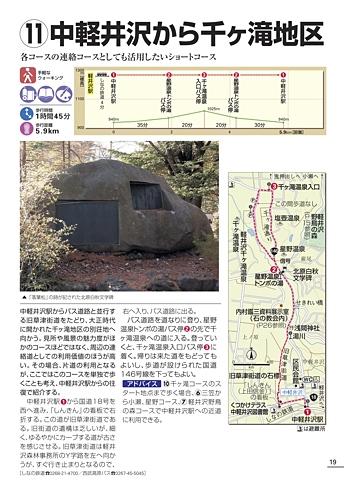 Here are four routes that allow you to encounter the standard Karuizawa scenery while also enjoying shopping.
Here are four routes that allow you to encounter the standard Karuizawa scenery while also enjoying shopping.
1. New Old Karuizawa Circle Route (Walking time: 2 hours, Distance: 6.7km) Starting from Karuizawa Station, the tour circles around downtown and quiet back streets to enjoy the atmosphere of a highland town.
2. Old Karuizawa Ginza Walking Route (Walking time: 1 hour 13 minutes Walking distance: 3.5 km) A careful walk from the main street to the back streets in the cradle of Karuizawa, a vacation home.
3. Shin-Karuizawa to Mikasa Route (Walking time: 1 hour and 15 minutes, Distance: 4.5 km) Passing through the beautiful larch trees, you will arrive at the former hotel, a western-style building with the romantic atmosphere of Meiji and Taisho Periods.
4. Nakakaruizawa to Chigataki area route (Walking time: 1 hour 45 minutes Walking distance: 5.9 km) This is a short course that can be used as a connecting course for each course.
![]()
- Starting from Karuizawa Station, the tour circles the downtown area and quiet back streets to fully enjoy the atmosphere of the highland town.
 The tour starts from Karuizawa Station. The tour will return to Karuizawa Station, taking in Shin-Karuizawa, which stretches between Karuizawa Station and Old Karuizawa; Kumoba Pond, with its seasonal charm; Old Karuizawa, the heart of Karuizawa; and the walking paths popular among summer vacationers.
The tour starts from Karuizawa Station. The tour will return to Karuizawa Station, taking in Shin-Karuizawa, which stretches between Karuizawa Station and Old Karuizawa; Kumoba Pond, with its seasonal charm; Old Karuizawa, the heart of Karuizawa; and the walking paths popular among summer vacationers.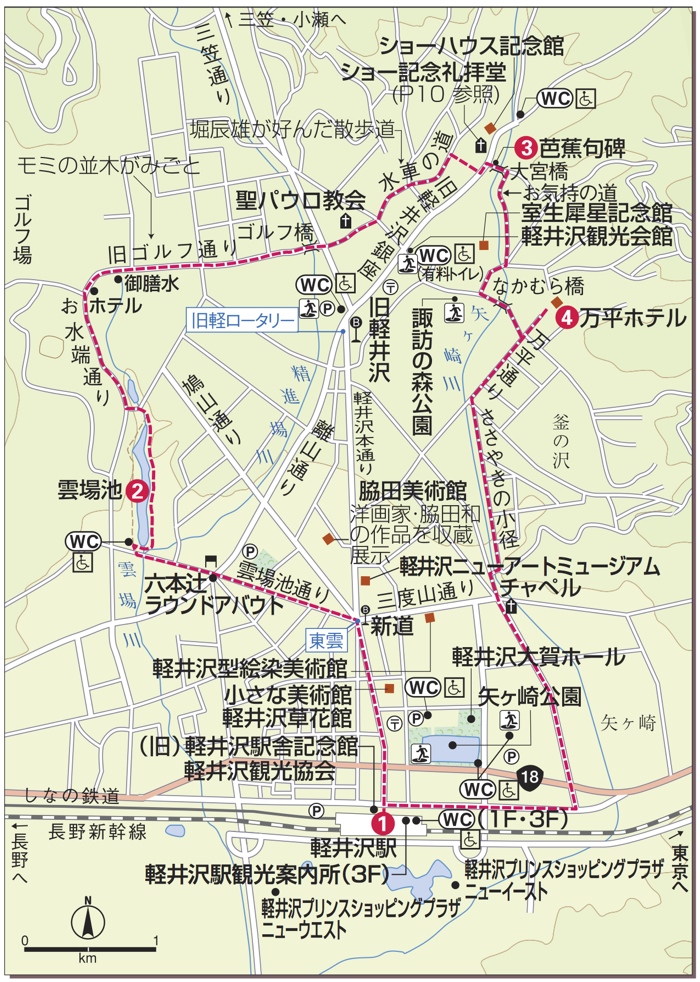
- Advice: You may walk only the first half of the route to Old Karuizawa, the midpoint of the route, or conversely, only the second half,
Old Karuizawa Ginza Walking Route Shin-Karuizawa to Mikasa Route
- You may also walk in combination with others as appropriate, such as *For more information, click on the image below to view the PDF file (
- (P8 and 9).
![]()
- A careful walk from the main street to the backstreets in the cradle of Karuizawa, a vacation home.
 The tour will mainly stroll along Ginza-dori, the face of Karuizawa. Although short, the course is rich in substance, with visits to historic sites, historic architecture, and literary monuments, all of which are the starting point of Karuizawa as a vacation resort. The contrast between the bustling Ginza-dori and the quietness of the area near the literary monument is also very atmospheric.
The tour will mainly stroll along Ginza-dori, the face of Karuizawa. Although short, the course is rich in substance, with visits to historic sites, historic architecture, and literary monuments, all of which are the starting point of Karuizawa as a vacation resort. The contrast between the bustling Ginza-dori and the quietness of the area near the literary monument is also very atmospheric.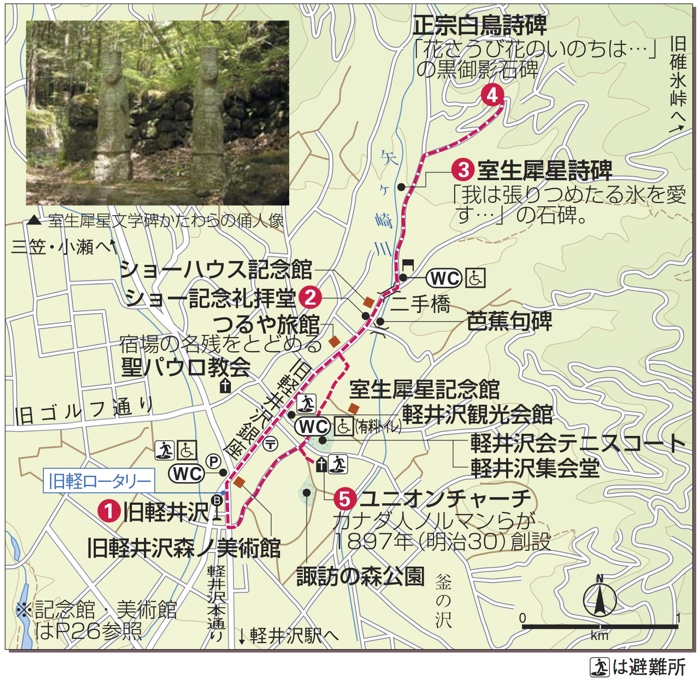
- If you do not go to the Masamune Swan Poem Monument but turn around at the Futate Bridge area, the walk will take only about 30 minutes, making it an even easier course. *For more information, click on the image below to view the PDF file (
- (P10).
![]()
- Passing through a beautiful larch tree-lined avenue, you will arrive at a former Western-style hotel with a romantic atmosphere of the Meiji and Taisho eras.
 From Karuizawa Station, follow Karuizawa Main Street, the shortest route to Old Karuizawa, and walk along Mikasa Street, lined with larch trees, a typical Karuizawa landscape, to the Old Mikasa Hotel.
From Karuizawa Station, follow Karuizawa Main Street, the shortest route to Old Karuizawa, and walk along Mikasa Street, lined with larch trees, a typical Karuizawa landscape, to the Old Mikasa Hotel.
- The highlight of this route is the larch trees between Kyu-Karuizawa and Mikasa in the latter half of the route.
- The first half of the route can be used as a route to visit Old Karuizawa on foot. The first half of the route is highly valuable as a route when visiting Old Karuizawa on foot between Old Karuizawa and New Karuizawa as well. For more information, click the image below to view the PDF file (Japanese only).
- (P11).
![]()
- A short course to be used as a liaison course for each course.
 From Nakakaruizawa Station, follow the old Kusatsu Kaido road parallel to the bus road to the villa district of Chigataki, which was opened in the Taisho era (1912-1926). The attractions and scenery are not as attractive as other courses, and the road is more valuable as a connecting route to the surrounding area. In such a case, one-way use is recommended, but here we introduce a round-trip route from Nakakaruizawa Station, considering the possibility of walking this course independently.
From Nakakaruizawa Station, follow the old Kusatsu Kaido road parallel to the bus road to the villa district of Chigataki, which was opened in the Taisho era (1912-1926). The attractions and scenery are not as attractive as other courses, and the road is more valuable as a connecting route to the surrounding area. In such a case, one-way use is recommended, but here we introduce a round-trip route from Nakakaruizawa Station, considering the possibility of walking this course independently.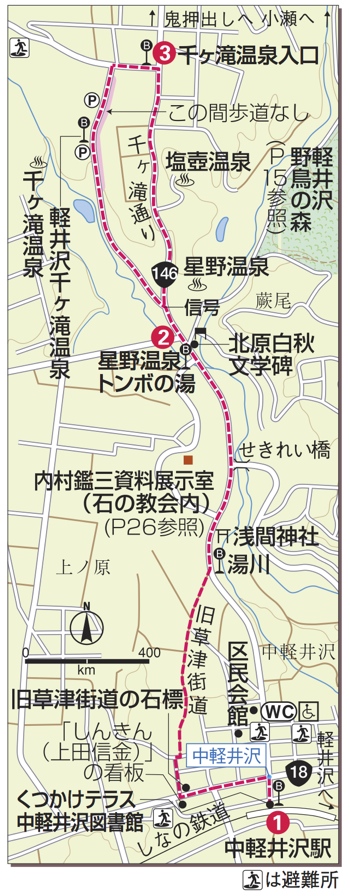
- Advice》10: If you walk to the start of the Chigataki Course, you can use the ⑥Mikasa to Ose and Hoshino Course and ⑦Karuizawa Wild Bird Forest Course as a shortcut to Nakakaruizawa Station. *For more information, click on the image below to view the PDF file (
- (P19).






